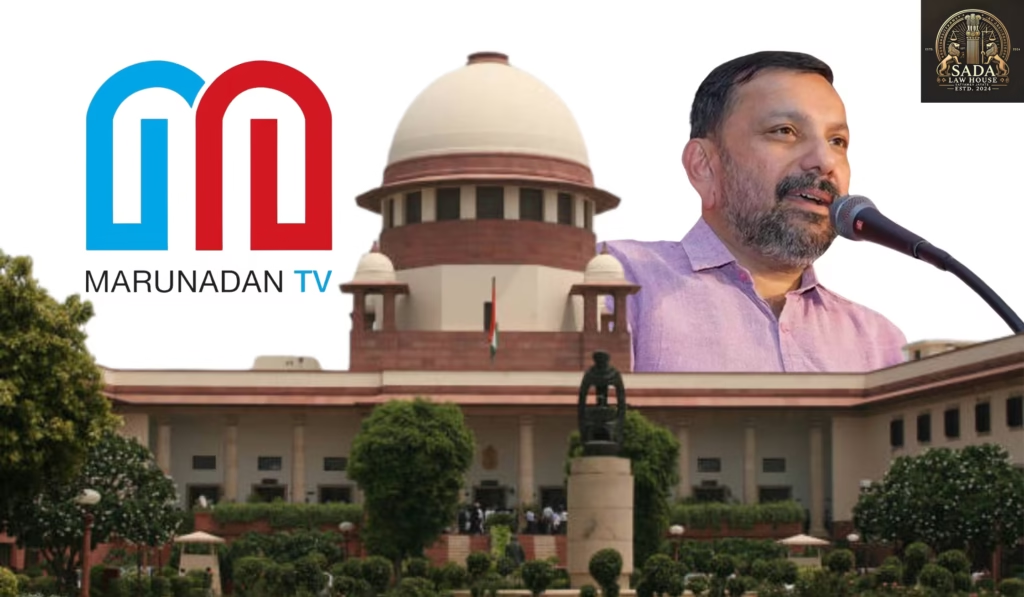Supreme Court Ruling on Anticipatory Bail in SC/ST Act Cases: Shajan Skaria vs State of Kerala (2024)
Trending Today Supreme Court Grants Interim Bail to Professor Ali Khan Mahmudabad Amid Operation Sindoor Post Controversy; SIT Formed for Investigation Supreme Court Ruling on Anticipatory Bail in SC/ST Act Cases: Shajan Skaria vs State of Kerala (2024) Supreme Court Mandates Three Years of Legal Practice for Judicial Service Eligibility Kerala High Court Questions Withholding of 10th Grade Results in Shahabas Murder Case Delhi High Court Rules in Favor of Sanitation Worker, Shifts Burden of Proof to Employer After Testimony Punjab and Haryana High Court rejects PIL Seeking ‘Martyr’ Status for Pahalgam Terror Attack Victims Supreme Court on Modification of Arbitral Awards Under Sections 34 and 37: Gayatri Balasamy v. ISG Novasoft Explained Supreme Court Rules Only Vaishnav Sampradaya Members Can Be Receivers of Mathura Temples Rajasthan High Court Flags Lack of Law for Coaching Centers Amid Surge in Student Suicides in Kota Punjab & Haryana High Court Warns Litigant Over Contemptuous Remarks Against Judges in Maya Devi Will Case Supreme Court Ruling on Anticipatory Bail in SC/ST Act Cases: Shajan Skaria vs State of Kerala (2024) NITU KUMARI 21 May 2025 Explore the 2024 Supreme Court of India judgment in Shajan Skaria vs State of Kerala, analyzing the extent of the bar on anticipatory bail under the SC/ST Act. Learn how this landmark case balances legal safeguards with individual rights. Introduction The Scheduled Castes and Scheduled Tribes (Prevention of Atrocities) Act, 1989 was enacted to protect marginalized communities from caste-based discrimination and atrocities. However, the rigid interpretation of Section 18—barring anticipatory bail—has sparked significant legal debate. In Shajan Skaria vs The State of Kerala (2024), the Supreme Court clarified the extent of this bar, reshaping how anticipatory bail is viewed in SC/ST offences. Case Background: Key Facts In May 2023, Shajan Skaria, the appellant, published a video on YouTube accusing P.V. Srinijan, a Scheduled Caste MLA from Kerala, of corruption. A complaint was filed alleging that the video was defamatory and caste-insensitive. Filing of the FIR An FIR was registered on June 9, 2023, under: Section 120(o) of the Kerala Police Act Section 3(1)(r) – Intentional insult with intent to humiliate a member of SC/ST in public view Section 3(1)(u) – Promoting enmity against SC/ST communities under the SC/ST Act Following his arrest, the appellant’s anticipatory bail plea was rejected by both the Special Judge and the Kerala High Court due to the interpretation of Section 18 of the SC/ST Act. Legal Issue Before the Court Does Section 18 of the SC/ST Act impose an absolute bar on granting anticipatory bail in offences registered under the Act? Supreme Court Judgment: A Landmark Clarification On August 23, 2024, a two-judge bench of the Supreme Court overturned the High Court’s decision and granted anticipatory bail to Shajan Skaria, ruling that Section 18 of the SC/ST Act does not create a blanket prohibition. Key Takeaways from the Judgment Ratio Decidendi The Court held that anticipatory bail is not absolutely barred under Section 18 of the SC/ST Act. Judges must assess whether the complaint prima facie discloses caste-based intent to humiliate. Obiter Dicta The Court highlighted the misuse of SC/ST Act provisions in non-caste-related disputes. It emphasized the importance of context, especially when the accused are public figures or journalists. Guidelines for Lower Courts Conduct a preliminary inquiry to check for prima facie evidence of caste-based discrimination. Consider freedom of expression, especially in politically sensitive or public interest cases. Conclusion This judgment establishes a balanced legal precedent, protecting both: The liberty and rights of the accused, especially in politically or socially sensitive cases. The integrity and intent of the SC/ST Act, ensuring its use remains targeted at actual caste-based offenses. By requiring prima facie evidence of caste-based intent, the Court has curbed potential misuse while maintaining legal safeguards for vulnerable communities. Frequently Asked Questions (FAQs) Can anticipatory bail be granted under the SC/ST Act? Yes. The Supreme Court of India has ruled that anticipatory bail can be granted if the allegations do not establish prima facie caste-based intent. What is the role of Section 18 in the SC/ST Act? Section 18 restricts anticipatory bail for offences under the Act, but it does not impose an absolute ban—courts must evaluate the presence of caste-based motivation. Why is this case significant? It provides a clarifying precedent for handling politically sensitive cases under the SC/ST Act and strengthens the framework for fair trials and free speech. Leave a Reply Cancel Reply Logged in as Sada Law. Edit your profile. Log out? Required fields are marked * Message* Case Laws Supreme Court Ruling on Anticipatory Bail in SC/ST Act Cases: Shajan Skaria vs State of Kerala (2024) Supreme Court Ruling on Anticipatory Bail in SC/ST Act Cases: Shajan Skaria vs State of Kerala (2024) Sada Law • May 21, 2025 • Case law • No Comments Supreme Court on Modification of Arbitral Awards Under Sections 34 and 37: Gayatri Balasamy v. ISG Novasoft Explained Supreme Court on Modification of Arbitral Awards Under Sections 34 and 37: Gayatri Balasamy v. ISG Novasoft Explained Sada Law • May 20, 2025 • Case law • No Comments Supreme Court Rules Only Vaishnav Sampradaya Members Can Be Receivers of Mathura Temples Supreme Court Rules Only Vaishnav Sampradaya Members Can Be Receivers of Mathura Temples Sada Law • May 20, 2025 • Case law • No Comments 1 2 3 … 5 Next »

